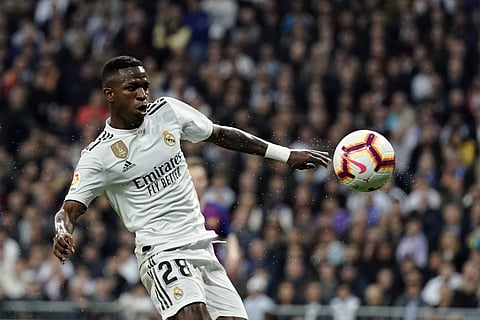

DOHA: In many ways, this World Cup is a déja vu for Brazil coach Tite: he will once again encounter Serbia and Switzerland and once again the success of the tournament of the five-time world champions will hinge on how they deal with European elite opposition.
In 2016, Tite took over from Carlos Dunga and became King Midas - whatever he did and touched turned into gold. Spearheaded by Gabriel Jesus, Brazil breezed through the World Cup qualifiers, but the striker failed to rekindle the same form at the World Cup in Russia. The South Americans struggled against Switzerland. Throughout the build-up of the tournament in Russia, Brazil had struggled to break down with deep-lying defences, but it was the quarter-final against Belgium that came to define Tite’s reign with Brazil.
In Kazan, the graveyard of the great, Brazil fell to the barnstorming Belgians in a match for the ages. Roberto Martinez’s curveball - playing striker Romelu Lukaku on the right - wrecked the Brazilians. They were knocked off balance and the Seleçao’s second-half response was in vain, with Thibaut Courtois’s fingertips preventing extra time.
That defeat shocked Tite. He admitted that it even kept him up at night. The first Brazil coach since Claudio Coutinho in 1978 to stay on after a World Cup, Tite reinforced his midfield. In his head, he played out that quarter-final against Belgium over and over. How could he have overcome Belgium? And so, something of the old Tite returned. At heart, perhaps, Tite is a pragmatic and defensive-minded coach. He has principles, but he won’t commit to ideals, the way Marcelo Bielsa and others do. Balance trumps idealism, in his view.
Balance has always been a key theme in Brazilian football and is no better embodied than by Mario Zagallo. In 1958, Brazil played a 4-2-4, but Zagallo transformed that into a 4-3-3 by shuttling up and down the left flank, giving Brazil more defensive cover in midfield. That also became the formation in 1970 when Brazil triumphed for the third time in an era-defining World Cup.
Since 2018, Tite has struggled with the balance of his squad, but the defensive midfield pair of Casemiro and Fred enjoys his preference to shield the defence. He doesn’t trust Lucas Paqueta’s defensive skills. Neymar plays in the hole behind Richarlison and is flanked by Raphinha and Vinicius Jr. The frightening forward line is Brazil’s greatest strength. They play a 2-3-5 formation when attacking and few defences can resist such firepower. Tite even had the luxury of leaving Liverpool’s Roberto Firmino at home, such is the wealth at his disposal. More importantly, Brazil is no longer Neymar-dependent.
Vinicius power
The emergence of Vinicius Junior and other attacking talents has been a godsend for Tite. Neymar remains the lodestar of the team, the talisman who, at times, infuriates by his tendency for diving, but he is no longer the centre of gravity. He no longer carries the responsibility of ensuring Brazilian success all by himself.
From the destitute commuter city of Sao Gonçales to Real Madrid, Vinicius Junior’s rise has been phenomenal, the latest product of the conveyor belt of Brazilian talent. It was always a gamble to cross the Atlantic at such a young age, but Vinicius Jr has excelled in the Spanish capital, scoring the winning goal in last season’s Champions League final to crown his club European champions for the 14th time.
He links up well with Neymar, something that was evident in Brazil’s last friendly before the World Cup when they steamrollered Tunisia 5-1. But the significance of that win as well as Brazil’s unbeaten record in the South American qualifiers is limited. Ultimately, the benchmark is defeating Europe’s best teams and with the introduction of the Nations League, Brazil’s opportunities to play Germany and other powerhouses from the Old Continent are non-existent. In 2019, Brazil last played European opposition, defeating the Czech Republic 3-0 in Prague.
It’s been 20 years since Brazil last won the ultimate prize in football. Italy, Spain, Germany and France won the next four World Cups, a sign that the rest of the World Cup can no longer keep up with Europe which excels at youth development on an industrial scale. With some European teams out of shape or going through a transition, this tournament represents South America’s best chance to reclaim the global crown. However, on Tuesday, Messi and Argentina, unbeaten in the South American qualifiers as well, were upstaged by Saudi Arabia. Brazil will tolerate no such result against Serbia in their opening match, a first chance to beat a European team and that’s what it will be all about at this World Cup.